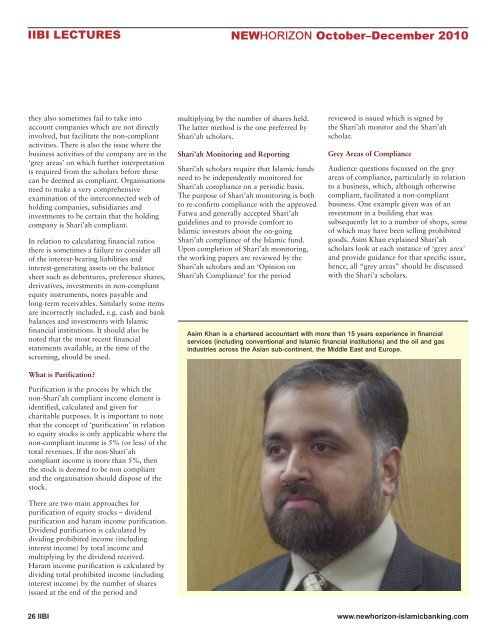NEWHORIZON
NEWHORIZON - Institute of Islamic Banking and Insurance
NEWHORIZON - Institute of Islamic Banking and Insurance
- No tags were found...
You also want an ePaper? Increase the reach of your titles
YUMPU automatically turns print PDFs into web optimized ePapers that Google loves.
IIBI LECTURES<br />
<strong>NEWHORIZON</strong> October–December 2010<br />
they also sometimes fail to take into<br />
account companies which are not directly<br />
involved, but facilitate the non-compliant<br />
activities. There is also the issue where the<br />
business activities of the company are in the<br />
‘grey areas’ on which further interpretation<br />
is required from the scholars before these<br />
can be deemed as compliant. Organisations<br />
need to make a very comprehensive<br />
examination of the interconnected web of<br />
holding companies, subsidiaries and<br />
investments to be certain that the holding<br />
company is Shari’ah compliant.<br />
In relation to calculating financial ratios<br />
there is sometimes a failure to consider all<br />
of the interest-bearing liabilities and<br />
interest-generating assets on the balance<br />
sheet such as debentures, preference shares,<br />
derivatives, investments in non-compliant<br />
equity instruments, notes payable and<br />
long-term receivables. Similarly some items<br />
are incorrectly included, e.g. cash and bank<br />
balances and investments with Islamic<br />
financial institutions. It should also be<br />
noted that the most recent financial<br />
statements available, at the time of the<br />
screening, should be used.<br />
multiplying by the number of shares held.<br />
The latter method is the one preferred by<br />
Shari’ah scholars.<br />
Shari’ah Monitoring and Reporting<br />
Shari’ah scholars require that Islamic funds<br />
need to be independently monitored for<br />
Shari’ah compliance on a periodic basis.<br />
The purpose of Shari’ah monitoring is both<br />
to re-confirm compliance with the approved<br />
Fatwa and generally accepted Shari’ah<br />
guidelines and to provide comfort to<br />
Islamic investors about the on-going<br />
Shari’ah compliance of the Islamic fund.<br />
Upon completion of Shari’ah monitoring,<br />
the working papers are reviewed by the<br />
Shari’ah scholars and an ‘Opinion on<br />
Shari’ah Compliance’ for the period<br />
reviewed is issued which is signed by<br />
the Shari’ah monitor and the Shari’ah<br />
scholar.<br />
Grey Areas of Compliance<br />
Audience questions focussed on the grey<br />
areas of compliance, particularly in relation<br />
to a business, which, although otherwise<br />
compliant, facilitated a non-compliant<br />
business. One example given was of an<br />
investment in a building that was<br />
subsequently let to a number of shops, some<br />
of which may have been selling prohibited<br />
goods. Asim Khan explained Shari’ah<br />
scholars look at each instance of ‘grey area’<br />
and provide guidance for that specific issue,<br />
hence, all “grey areas” should be discussed<br />
with the Shari’a scholars.<br />
Asim Khan is a chartered accountant with more than 15 years experience in financial<br />
services (including conventional and Islamic financial institutions) and the oil and gas<br />
industries across the Asian sub-continent, the Middle East and Europe.<br />
What is Purification?<br />
Purification is the process by which the<br />
non-Shari’ah compliant income element is<br />
identified, calculated and given for<br />
charitable purposes. It is important to note<br />
that the concept of ‘purification’ in relation<br />
to equity stocks is only applicable where the<br />
non-compliant income is 5% (or less) of the<br />
total revenues. If the non-Shari’ah<br />
compliant income is more than 5%, then<br />
the stock is deemed to be non compliant<br />
and the organisation should dispose of the<br />
stock.<br />
There are two main approaches for<br />
purification of equity stocks – dividend<br />
purification and haram income purification.<br />
Dividend purification is calculated by<br />
dividing prohibited income (including<br />
interest income) by total income and<br />
multiplying by the dividend received.<br />
Haram income purification is calculated by<br />
dividing total prohibited income (including<br />
interest income) by the number of shares<br />
issued at the end of the period and<br />
26 IIBI<br />
www.newhorizon-islamicbanking.com
















